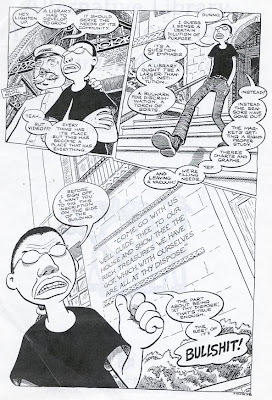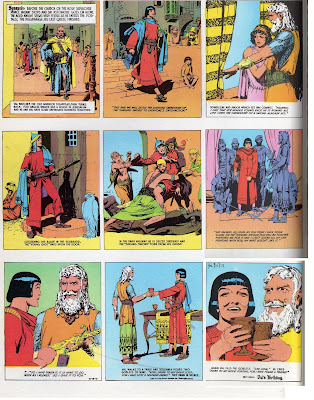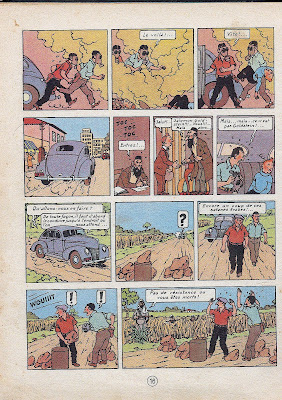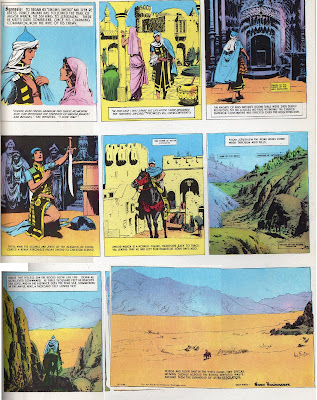While I can't hope to be comprehensive or exhaustive in a 40-minute presentation, I will try to provide answers to such questions as "who?", "what?" "where?" & "when", with respect to what I feel are the most interesting comics that have depicted Israel & Israelis during the 75-year history of the modern comic book.
Before I do so, though, I think it's important to ask the 5th "W" question : "WHY?". Specifically, why should any of us librarians even be interested in looking at this format when no more than 10% of your library patrons - whether you're representing a public, school, synagogue, or university library - even walk into a comic book store at least once a year.
Rather than answer that question, I'll deem it as irrelevant. Comic stories are no longer restricted to the ghettoes of the funny pages in newspapers and comic books found in comic shops. They're also found in graphic novels on bookstore shelves, on countless websites and in popular magazines.
Below is the 2nd page of "Hebron : A Look Inside" by comic journalist Joe Sacco. This appeared in Time Magazine 6 years ago (Mar. 12, 2001).
This is page 1 of "The Underground War in Gaza", also by Sacco, which appeared in The New York Times Magazine just 4 years ago (July 3, 2003). The article is still on the New York Times website and was found on the website of SRI International.
Generally speaking, Sacco tends to portray Israelis (and, in particular, Israeli politicians and soldiers) as cruel, manipulative, sadist outsiders who are oppressing the indigenous, caring, freedom-fighter Palestinians.
I'll come back to Sacco later, but in the interest of full disclosure, I should mention that one of the reasons I'm not one of his biggest fans is a piece he did which ridiculed librarians and patrons alike called "Voyage to the End of the Library" (Yahoo #3, April 1990), reprinted in Alternative Library Literature 1992/1993 : a biennial anthology Jefferson, NC: McFarland & Co., p. 30-38 and Notes from a Defeatist Fantagraphics Books, 2003, p. 109-118).
Buy Notes from a Defeatist
Google Search
Goodreads Israel Comix Bookshelf
Saturday, April 26, 2008
Introduction
Sunday, April 20, 2008
1930s
On the left is the original page 15 of Tintin au Pays de l'Or Noir, written & illustrated in Belgium by Hergé (Georges Prosper Remi), serialized in Le Petit Vingtième (September 28, 1939 - May 8, 1940 / September 16, 1948 - February 23, 1950) and then published as a an album by Casterman in 1950 - just 2 years after the UN partition vote.
The delay between May 1940 and Sept. 1948 was due to the Nazi occupation of Belgium. Hergé and his editors thought it wouldn't be prudent to continue a story which involved a German villain while the Nazis controlled the Belgian press.
On the right is the version redrawn in 1972 for the Methuen (British) translated edition. Methuen decided that references to British mandate Palestine were far out of date and a fictional Arab country was used for the setting instead.
Sunday, April 13, 2008
1940s
Among the earliest depictions of Israel in comix are the retellings of Biblical stories, particularly those which ocurred after the Jews entered into the Holy Land (i.e. from the book of Prophets onward). Numerous Biblical comics have been published since the 1940's, which puts them into a separate category of its own. Therefore, I will limit the scans for such adaptations to the one below, which is the cover of Picture Stories from the Bible #4 (Fall 1943), depicting the prophet Elijah.
Buy Picture Stories from the Bible : Old Testament
During the 1940's Hal Foster wrote & elegantly illustrated a Sundays-only color comic strip about an Arthurian-age knight named Val. In a storyline in which Val travels to the Middle East to get back his special "singing sword", Val ends up in the Israel of the Middle Ages twice, passing by or entering such famous sites as the Jaffa Gate, the Tower of David and the Church of the Holy Sepulchre. Though he doesn't seem to encounter any Jews during this pilgrimage, he does help fend off a group of Saracens (i.e. Muslims) who are attacking a fellow knight. This occurs in the strips published on May 25th & June 1st in 1941, reprinted in Prince Valiant : Companions in Adventure (Nostalgia Press, 1974) and Oct. 12th & Oct. 19th in 1941, reprinted in Prince Valiant : The Love of Aleta (Nostalgia Press, 1974).


Buy Prince Valiant : Companions in Adventure (with Prince Valiant : In The Days Of King Arthur)







